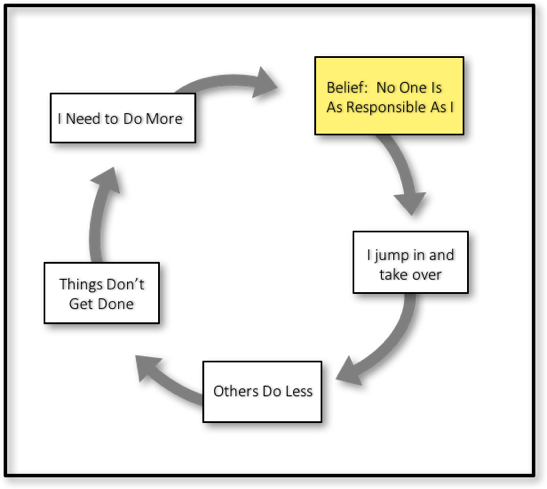Elizabeth B. Crook, longtime strategist and advisor to CEOs and entrepreneurs, offers Women 2.0 readers a handy exercise to do in the comfort of your own head. Here is her insight into how deeply our thoughts influence our work, the work of those around us, and outcomes.
What’s wrong with believing your success depends only on you?
If you are a tech “star,” and you are a woman, you have probably encountered some hurdles. Guys in tech seem to hire other guys. The hours can be crazy. There’s the stereotype that women do better in “people jobs” (of course people use tech, it’s only that the world often forgets that!).
But there’s one hurdle that many of us are blind to, and it can become a trap if we aren’t careful: We believe that success of any endeavor depends on us. We know we are good at what we do, we are thorough and we are committed to making sure the job is done right. You may be asking: And how is that a problem? Because these beliefs can become what I call a “Vicious Cycle”.
How the Vicious Cycle works.
As a business strategist with 25 years of experience working with men and women CEOs and high potential professionals, I have seen firsthand how the trap of the Vicious Cycle can disrupt your career. A Vicious Cycle keeps us stuck in self-defeating behavior. If you believe that the success of any endeavor depends on you, then you may have trouble delegating to others, or trusting that another professional in the industry can get the job done. And regardless of whether your belief is correct, your colleagues will respond to you based on your behavior. They may allow you to do all the work, depend on you rather than building their own skills, and be less friendly in the workplace because you have proven that you don’t really trust them.
Here’s what that Vicious Cycle might look like: To get a sense of how detrimental this can be, let’s take a look at Miranda, a star in the tech world who could untangle a piece of code faster than you could say Stacey Higginbotham (who is in fact a celebrity tech founder) three times fast. She and her colleague, Jasmin, started a company, but in spite of having great confidence in each other’s ability and a deep trust on a personal level, there was friction. Jasmin explained, “It just seems like Miranda insists on taking over. Sometimes I don’t even try to get things done because I know Miranda will do it over regardless.” Miranda complained, “It seems like I have to do everything around here. Other people used to do their part, but now it always falls on me!”
End the cycle of having a hard time with work.
You have probably already spotted the problem. You can bet that Miranda has a lifetime of examples about how she’s always the one people depend on. She’s the one who takes up the slack. And there’s a part of her that is tired of having to do everybody else’s work.
That’s one of the easiest ways to spot a vicious cycle. They always tire you out in the end. But they do prove that our beliefs are right. Though Miranda is worn out, her own belief and her corresponding behaviors have created a self-fulfilling prophecy: others aren’t doing their part. Miranda’s constant taking over discourages others from doing their share. What’s the point if Miranda is going to redo it?
A simple but powerful little exercise to try.
If you find yourself facing the same set of circumstances over and over, be willing to accept that you may have unintentionally helped create and maintain a Vicious Cycle. Pause and ask yourself: What do I believe about the situation? Here’s an exercise to try.
1. Write down what you think is your underlying belief – No one really appreciates my work (for example).
2. What action does this lead you to take? – I remind people how important my work is to the project
3. What is the reaction this seems to elicit? (This is a hard one because we may not be ready to admit what is really going on.) People still don’t seem to appreciate what I do, and in truth, even get irritated when I bring it up.
4. How do I feel about their reaction? – I feel even less appreciated.
5. Is your original belief even stronger? – I was right! No one really appreciates my work.
Once you have mapped out the cycle, you and only you can change your behavior! So, in the example above, you could talk less about your work and begin recognizing others contributions. When your behavior changes, others will change theirs in response. This monumental change won’t happen right away, but over time you will create a Virtuous Cycle, and be freed from the number one trap that could hinder your career. Let me know about your Vicious Cycle in the comments below. How will you get yourself into a Virtuous Cycle instead?
Elizabeth B. Crook is the CEO of Orchard Advisors, helping CEOs grow their bottom line and work effectively with their teams. Her new book is Live Large: The Achiever’s Guide to What’s Next. Download your free Personalized Success Plan worksheet today.

